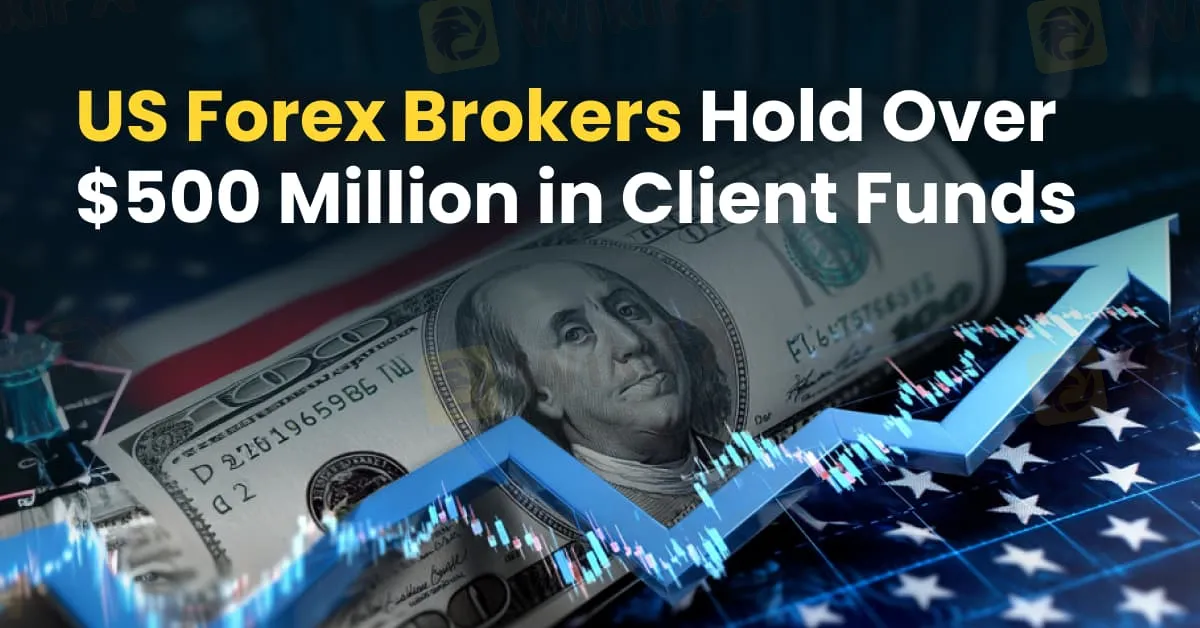简体中文
繁體中文
English
Pусский
日本語
ภาษาไทย
Tiếng Việt
Bahasa Indonesia
Español
हिन्दी
Filippiiniläinen
Français
Deutsch
Português
Türkçe
한국어
العربية
US Forex Brokers Hold Over $500 Million in Client Funds
Abstract:According to report, U.S. retail forex brokers collectively held approximately $527 million in client funds as of February 2025—a figure representing a 2.9% increase from January’s total of around $512 million, according to the latest regulatory data released by the Commodity Futures Trading Commission (CFTC).

According to report, U.S. retail forex brokers collectively held approximately $527 million in client funds as of February 2025—a figure representing a 2.9% increase from Januarys total of around $512 million, according to the latest regulatory data released by the Commodity Futures Trading Commission (CFTC). Despite the monthly growth, the current level marks a 2.9% year-over-year decline when compared with February 2024, highlighting both recent momentum and long-term market challenges.
Market Dynamics and Concentration
The U.S. retail forex market remains notably concentrated. The top three brokers—Gain Capital, Oanda, and Charles Schwab—hold a commanding share, collectively managing over 85% of client funds. This concentration is largely attributable to substantial regulatory barriers. For example, the industrys stringent requirements, including a minimum capital threshold of $20 million for forex dealers, have solidified the position of established players, effectively limiting the entry of new competitors.
Gain Capital Takes the Lead
Among the leading players, Gain Capital has maintained its strong market position with an impressive 42.7% share of the total client funds. As of February 2025, Gain Capital held about $225 million in client deposits. This figure not only represents a 6% month-over-month increase from January but also reflects a 7% year-over-year growth compared to February 2024. The consistent upward momentum at Gain Capital underscores its resilience and the trust it commands among U.S. forex traders.
Regulatory Landscape
According to the CFTC filing, all six registered retail foreign exchange dealers (RFEDs) operating in the U.S.—namely Gain Capital, Oanda, Charles Schwab, IG US, Interactive Brokers, and Trading.com—continue to exceed the regulatory minimum capital requirements. These capital buffers are designed to safeguard client funds and maintain market stability, ensuring that financial risks remain contained in an inherently volatile trading environment.
The monthly compilation of financial reports from futures commission merchants (FCMs) and RFEDs serves as a key indicator of market health and regulatory compliance in the forex sector. The sustained collection of these reports aids in monitoring market practices and enhancing investor protection measures across the industry.
Conclusion
While the slight increase in client funds from January to February 2025 is a positive signal of short-term market strength, the overall decline compared to February 2024 suggests that U.S. retail forex brokers continue to face long-term pressures. The combined impact of stringent regulatory requirements and market concentration presents a double-edged sword, fostering both stability and competitive challenges. Nonetheless, with market leaders like Gain Capital demonstrating robust performance, the outlook for U.S. forex brokers remains cautiously optimistic as they strive to balance regulatory compliance with the demands of an evolving market landscape.

Disclaimer:
The views in this article only represent the author's personal views, and do not constitute investment advice on this platform. This platform does not guarantee the accuracy, completeness and timeliness of the information in the article, and will not be liable for any loss caused by the use of or reliance on the information in the article.
Read more

Truth About Markets.com: 5 Hidden Risks Revealed
There are many brokers that offer too many promotions. Have you ever wondered why they do this? This Could be the story of Markets.com. Before you choose Markets.com, read about the hidden risks they never openly talk about.

Breaking News: OmegaPro Caught in a $650 Million Forex and Crypto Investment Scam
An indictment was leveled against two men in the District of Puerto Rico for their alleged involvement in the operation and promotion of OmegaPro, an international investment scheme that has led to financial losses worth over $650 million for investors. Check more about this story

5 Reasons: Microtrade Is a Red Alert
Is MicroTrade a scam or is it safe? This is a common question for many who are looking to invest or trade. Check out this article and you’ll see it is an investment scam

No License, No Security: CNMV Issues List of 10 Illegal Firms
Spain's financial watchdog, the National Securities Market Commission (Comisión Nacional del Mercado de Valores, CNMV), has issued warnings against 10 unlicensed forex brokers operating without proper authorization.
WikiFX Broker
Latest News
Global stock markets are calling Trump's bluff on tariffs
Trump's tariffs overshadow the pomp and pageantry as Macron meets King Charles
Boeing delivers most airplanes since late 2023 after ramping up 737 Max output
Inflation expectations drift back down to pre-tariff levels, New York Fed survey shows
MT4 vs MT5: A comprehensive comparison in terms of functionality
Top Forex Trading Strategies for the London Session
Swissquote Takes Full Control of Yuh Digital Finance App in Major Deal
Top 5 Forex Pairs Every Trader Should Have on Their Radar
What WikiFX Found When It Looked Into Decode Global
Treasury yields rise as Trump's new tariff rates in focus
Currency Calculator


